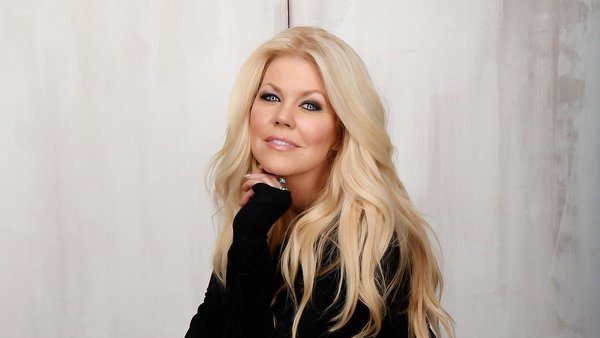
From about the age of three, Tracey Birdsall’s mother put her in singing and dancing classes at The Garri Dance Studio in Burbank, California (tap, jazz, ballet, the whole gamut). Although Tracey was a bit young to join the classes, She had an older sister who was very, very shy – so she (Tracey) was initially sent to encourage her (this happened a lot when she was little).
One of the very first performances included songs and dances which were a bit of an ensemble, with a bit of a solo. Tracey Birdsall had never had so much fun in her life. This led to a love of performing, entertaining, making people smile. As the years went on, she loved performing in theatrical productions and singing basically any opportunity that she had. At the age of 15, Tracey did her first union job in a Sunkist Soda commercial and was amazed at the pay – because she was really having a blast.
Tracey studied theater and acting – whilst auditioning – well into her twenties, landing sporadic but wonderful roles. She has been involved in either Television or Film for her entire adult life, without regard for the genre – only the roles that they brought. Tracey basically loves living the life of others and having the experiences become her own.
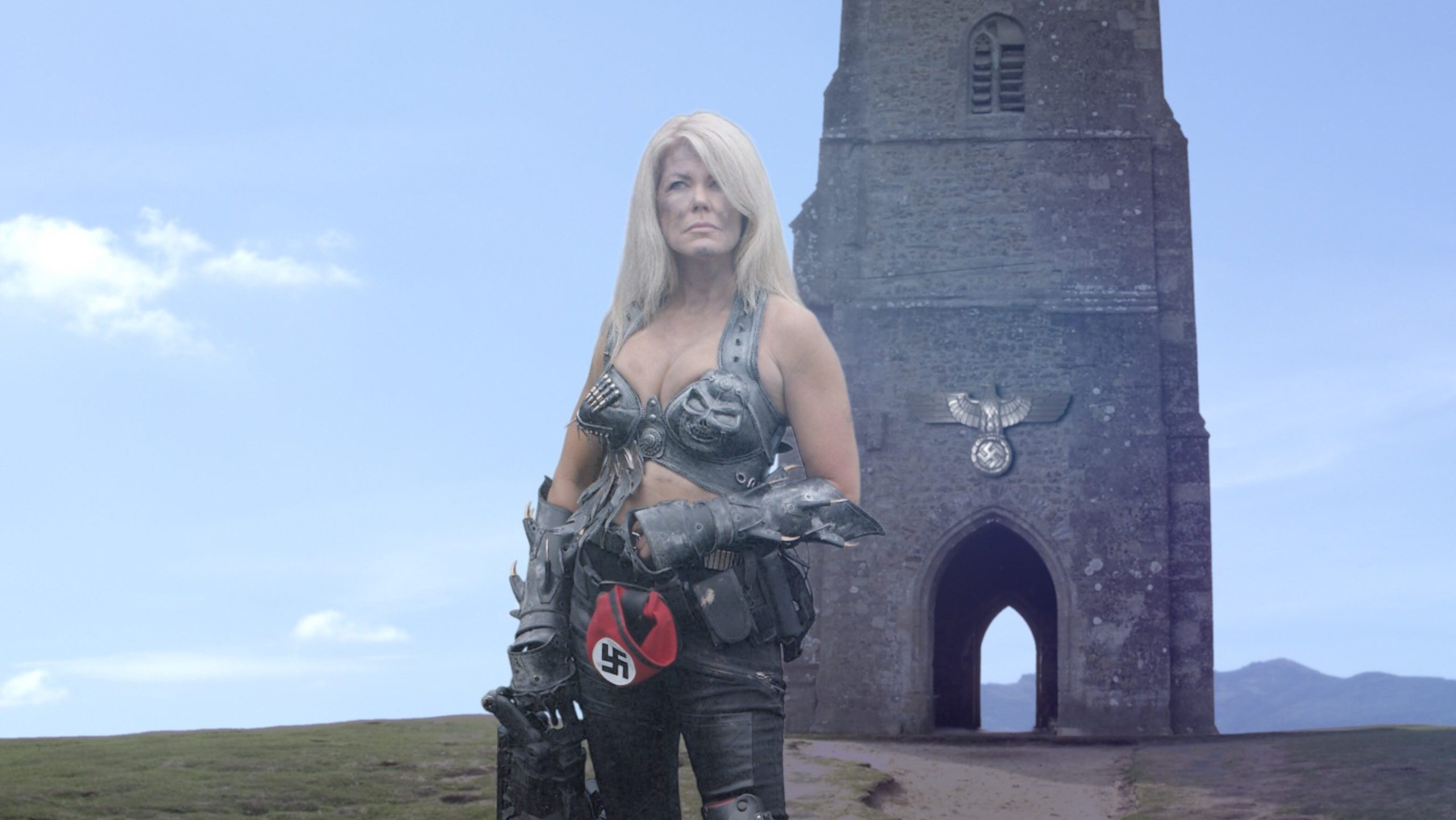
Did you study acting?
Tracey Birdsall (TB): In high school and college, I took theater and acting courses that were available – all that was available to me. Over the years, I studied many techniques (Alexander, Method, Meisner); however, the classes where I saw the most growth as a human being and as an actor were sporadic – Brian Reise, Sam Christiansen (on knowing yourself and branding), Lance Lindsey, and the Groundlings.
Although I don’t consider myself an “improv actor” at all, those classes taught me a level of freedom. Sam Christiansen helped me, at a very young age, see how the outside world saw me and my type – rather than how I saw myself (very valuable to this day). Everyone I’ve studied with, and there’s been dozens, contributed tools that I could use which as a whole added up to what I consider my technique. I’ll give credit where credit is due, in the next question.
What acting technique do you use?
Tracey Birdsall (TB): Margie Haber at the Margie Haber’s Studio introduced me to “living the life.” It was a drastic change for me, and very hard to grasp at first. When you have so many teachers over so many years (not to mention experiences on set), you really start to think that you know quite a bit. Wrong, Margie taught me that.
When I first started in her Masters Intensive Class, and later her Masters ongoing, just living the life of the character was quite difficult – heart-wrenching even. It took me quite a while to grasp it all, and I’ve coached with Margie between films several times since. You see, she was the first teacher that I’ve ever had where I felt worse about myself when I left then when I got there. This is a very IMPORTANT process that goes against the grain! Margie taught me to feel every feeling the meticulously prepared and created character went through in the first person – as that human.
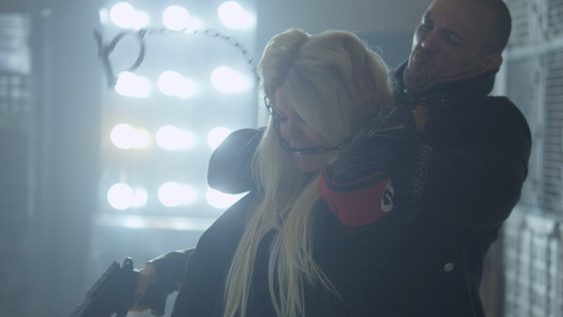
It’s really quite an incredible transformation, albeit painful at times. Every time I create a character, their thoughts/actions/feelings/likes/dislikes/everything, I live. It not only makes for the most interesting type of character to watch, but it allows us to learn from our characters and their journeys. The painful journeys now create internal scarring inside of me – as an experience I had in real life. The realizations the characters have and the epiphanies are mine too, and I carry them throughout my daily life. If I’m sick on a day, that character is sick (one of my favorite scenes in Rogue Warrior was shot on a day that I was so sick with a virus that I could barely walk)…what we are is what the character is – and it’s so interesting to just live it and let it unfold!
I’ve quite literally worked consistently ever since studying with Margie, and I see her as the real key that brought everything together. Live don’t act, feel everything, put your effort into creating your character (I usually do this months in advance – tirelessly), and your character will know what to say because it’s their life. Prepare meticulously and then live.
You’re an experienced actor, how much work do you put into your scenes?
Tracey Birdsall (TB): I know I’m not normal in this… I put everything into my work. If I book something four months in advance, I work 10-14 hours a day (at minimum) until we shoot. I don’t go out, I don’t meet up with friends, I prepare. Every hour and every day that I work on a character, I find something new about them and integrate it. The more time spent on preparation, ultimately the better it will be. The more time spent being myself (not preparing), the more of myself that is left in the character, and my job is not to be me – but to be my character.
To make my point, I ran into a very good friend of mine today (Betsy Russell) who lives maybe a mile from me. Betsy and I go decades back, and it felt like it had been maybe a couple of months since I had seen her (I’ve been constantly working on The Time War lately.) In conversation, we realized it had been more than 5 months! I really lose track of reality and my surroundings when I’m so focused, and I really look forward to catching up with Betsy when we wrap in a few weeks!
Anything less than everything is not enough. Full focus, all in. After all, we get paid to do what we love…!
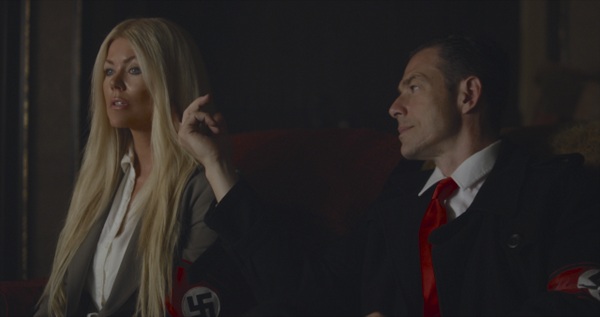
You have worked on: ‘Who’s Jenna…?’, ‘At the Edge of Time’, ‘Rogue Warrior: Robot Fighter’, ‘Doomsday’, ‘Starship: Apocalypse’, ‘The Young and the Restless’. How has each show impacted your work as an actor and your career?
Tracey Birdsall (TB): Every project I commit to doing has an impact upon me, every opportunity, every experience. Oftentimes, as actors, we don’t see the line between what we get from each individual opportunity, but more so as a whole. When you only have a week or a few weeks between characters, the time is better spent on creating the next character rather than reflecting upon the prior experience. The exception to that, however, would be the relationships.
Every project has relationships, so I do try and feel that experience after being thrust into a new environment and “assigned” my new family, work partners, lovers, and friends. You have to live it, and part of that stays with you throughout your life. Those relationships, although cast, are your real relationships during filming – so all of those relationships impact my life. Oftentimes we will work with these people again on screen, or remain friends off-screen. The biggest project that has had an impact on my career to date is always the last project that I worked on. Every project has to be bigger and better than the last, more challenging… As Rogue Warrior: Robot Fighter is my most recently released project, I can see that the efforts I put into it physically, emotionally – not to mention the endless hours preparing – are having a huge impact. It’s difficult to specifically state how, and maybe pointless. I’ll reflect when I’m not working!
How does your work in, “Rogue Warrior: Robot Fighter” compare to “Who’s Jenna…?”
Tracey Birdsall (TB): There was nothing similar about those two shoots! Gravely different in genre and character (big comedy vs. Sci-Fi drama), shooting style, etc. Both wonderful films, but vastly different experiences. Who’s Jenna…? required the preparation commitment, but only about 10 days of shooting on my part as they shot around me (I was the only actor from the West Coast).
Rogue Warrior: Robot Fighter had principal photography of 3 weeks, with approximately 60 additional shooting days on my part. Both casts were well-prepared wonderful actors. Tom Baldinger (who directed Who’s Jenna…?) was generally really happy with what each of the actors brought to the table performance-wise, wherein Neil Johnson directed Rogue Warrior with the precision of threading a needle each time (he can be a bit brutal – but it’s an amazing process!)
In“Rogue Warrior: Robot Fighter”, how did you prepare for the role: The cast, the crew, the physicality, the terrain, the climate, weather, and the demands of the film?
TB: There was a lot of collaboration prior to shooting Rogue Warrior, so we didn’t rehearse as much. During principal photography, we would rehearse for blocking – mostly because so many actors were involved in the scenes.
Preparation for the film was an “all in” situation, as I not only had the character to create and live but also the physical nature of the scenes. Already a very athletic person who becomes a bit of a gym rat when not shooting, I had to bulk up quite a bit for endurance if nothing else. Many of those action scenes were shot in extreme heat, and many many times (to allow for angles and aerials), so it was a huge commitment. Many months to prepare the character, many months of living the character, many months of healing the character…
When you sign on as a lead in a technical sci-fi film, you are initially committing over 1,000 hours just in getting entirely off-book so that you CAN create the character. That’s when the process begins…
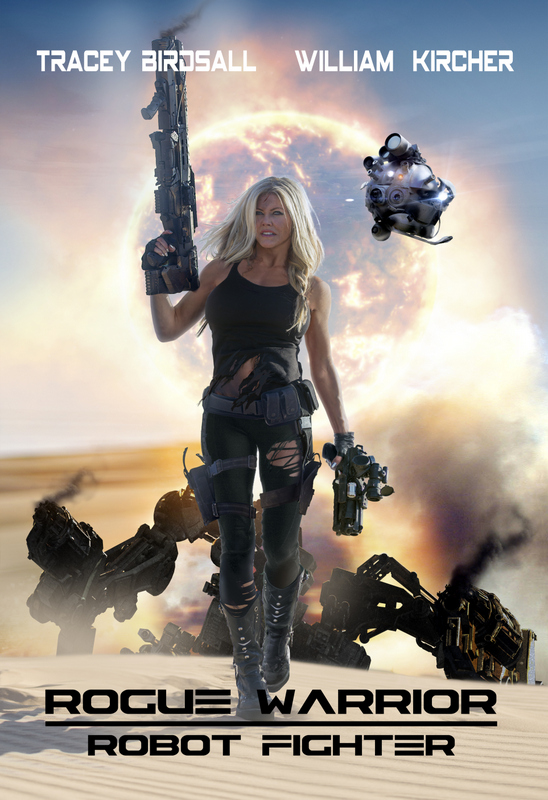
When you shot “Who’s Jenna…?” how did you create the character?
TB: Seeing as Who’s Jenna…? related only to me “looking like” Jenna (a doppelgänger so to speak), creating Jenna was entirely up to me. The clues, just like any other film, are in the script – in who the character is. The creation process is up to the actor. Again, as with Rogue Warrior, the director and I spoke many times prior to the shoot dates. Collaborating in the initial stages leads to everyone being on the same page once shooting commences.
How do you stay fresh on set?
TB: I’m that actor that oftentimes disappears on a film set! When things get a bit chatty, I will usually go and find a quiet corner. When you play a lead role in a film, your first priority is to be on point, prepared, the strongest link. I’m known to sneak off during lunch to re-group and stay in my mindset.
As far as between takes, the director’s voice is all that you hear. I’m living a life, and a voice comes between the layers and guides you. There’s no issue with breaking character when you’re listening and being. Sometimes crew chatter can start to create white noise in the room, in which case I can politely make a recommendation that it ceases – but it’s usually not a problem.
Explain one creative choice you took on set?
TB: Creative choice is an interesting term when you’re living a life. I’ve gotten emotional in scenes that initially didn’t call for emotion, just because when you live it as the character sometimes there’s an emotion that you wouldn’t otherwise feel if you used another method. It’s oftentimes valid, however, as it’s the colors beneath creeping through. I’ve had the director “tone” it – but never remove it because it’s valid at that point from that perspective.
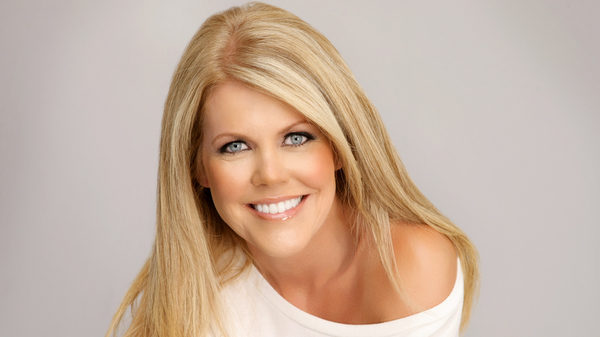
Describe a memorable character you played?
TB: The most challenging, and yet to be the most memorable, is the one I’m living now. Due to the nature of the film I’m working on currently (The Time War) – time travel. I play Dijanne, but there’s a catch. She travels through time and interacts with various versions of herself… this required creating many characters within a character. This should be released early to mid-2018 and is technically the hardest thing I’ve ever done. I literally have a mental checklist that I go through when transitioning from one version to another…
What do you want most from a director?
TB: Passionate about what he does, talented and skilled, experienced.
What actors do you long to work with?
TB: Meryl Streep, Daniel Day-Lewis, Leonardo DiCaprio, and Benedict Cumberbatch
Why?
TB: They are all brilliant. I love working with brilliant actors. I always feel like a part of it rubs off!
What advice would you give to actors
TB: Work harder than anyone around you. Find an acting coach that doesn’t praise you (so that you can grow). Study with Margie Haber if you’re ever in Los Angeles, or if she tours near you (especially if you think you don’t need to.) Be the best you that you can be. Only compete with yourself.
Follow Tracey Birdsall in Social Media
Website
IMDB
Facebook
Twitter
Instagram
Google+
Richard Green Documentary, ‘I Know Catherine, The Log Lady’: Premiere in NYC, LA May 9th
Lynchian Doc I Know Catherine, The Log Lady Makes Hollywood Premiere 4/17, Rollout to Follow
In Camera by Naqqash Khlalid Launch on VOD April 29
Naqqash Khlalid’s Directs Nabhan Rizwan. In Camera stars an EE BAFTA Rising Star Award Nominee.
2025 Philip K. Dick Sci-Fi Film Festival Award Winners Announced
Vanessa Ly’s Memories of the Future Awarded Best PKD Feature
Dreaming of You by Jack McCafferty Debuts VOD & DVD for April Release
Freestyle Acquires “Dreaming of You” for April 15th Release
Hello Stranger by Paul Raschid set for London Games Festival & BIFFF
The film Is set for an April 10th Premiere at The Genesis Cinema in London (LGF) and BIFFF
Daydreamers Official Trailer by Timothy Linh Bui: Released by Dark Star Pictures
Daydreamers Vietnamese Vampire Thriller – May 2nd release









